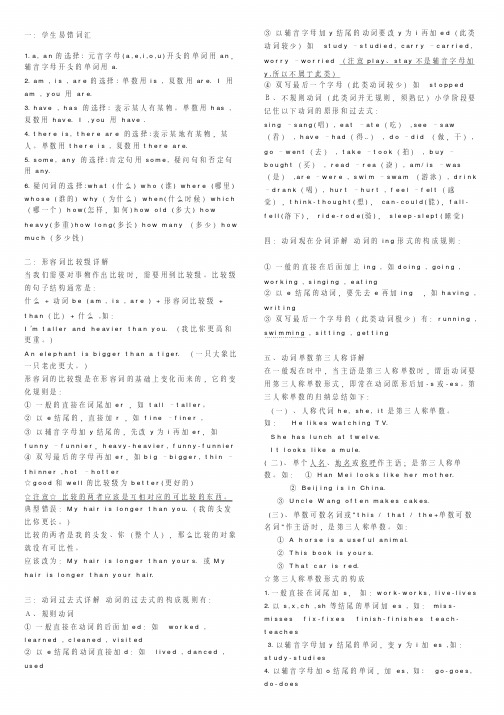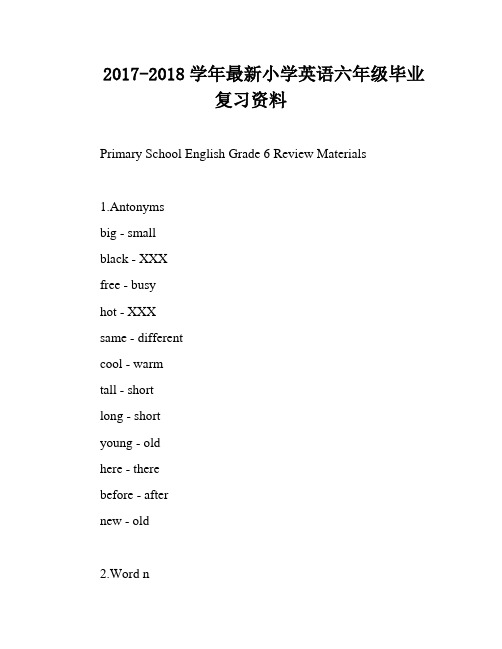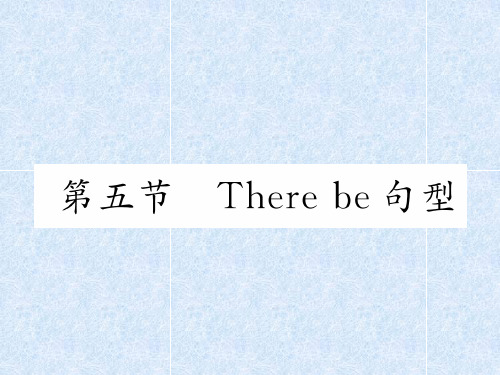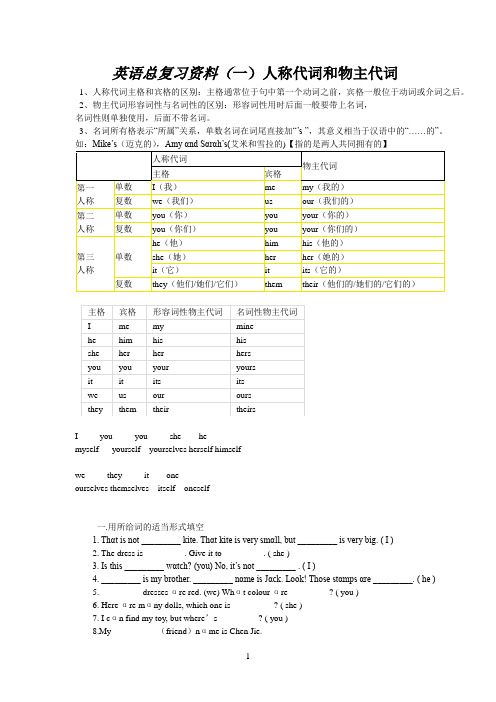2018年PEP小学英语毕业总复习资料(原版)
PEP人教版小学六年级毕业班英语复习资料(三至六年级)

一:学生易错词汇1.a,a n的选择:元音字母(a,e,i,o,u)开头的单词用a n,辅音字母开头的单词用 a.2.a m,i s,a r e的选择:单数用i s,复数用ar e.I用a m,y o u用a r e.3.h a v e,h a s的选择:表示某人有某物。
单数用h as,复数用h a v e.I,y ou用h a v e .4.t h e r e i s,t h e r e a r e的选择:表示某地有某物,某人。
单数用t h e r e i s,复数用t h e r e a r e.5.s o m e,a n y的选择:肯定句用s o m e,疑问句和否定句用a n y.6.疑问词的选择:w h a t(什么)w h o(谁)w h e r e(哪里) w h o s e(谁的)w h y(为什么)w h e n(什么时候)w h i c h (哪一个)h o w(怎样,如何)h o w o l d(多大)h o wh e a v y(多重)h o w l o n g(多长)h o w m a n y(多少)h o w m u c h(多少钱)二:形容词比较级详解当我们需要对事物作出比较时,需要用到比较级。
比较级的句子结构通常是:什么+动词b e(a m,i s,a r e)+形容词比较级+t h a n(比)+什么,如:I’m t a l l e r a n d h e av i e r t h a n y o u.(我比你更高和更重。
)A n e l e p h an t i s b i g g e r t h a n a t i g e r.(一只大象比一只老虎更大。
)形容词的比较级是在形容词的基础上变化而来的,它的变化规则是:①一般的直接在词尾加e r,如t a l l–t a l l e r。
②以e结尾的,直接加r,如f i n e–f i n e r,③以辅音字母加y结尾的,先改y为i再加e r,如f u n n y–f u n n i e r,h e a v y-h e a v i e r,f u n n y-f u n n i e r④双写最后的字母再加e r,如b i g–b i g g e r,t h i n–t h i n n e r,h o t–h o t t e r☆g o o d和w e l l的比较级为b e t t e r(更好的)☆注意☆比较的两者应该是互相对应的可比较的东西。
小学PEP英语毕业总复习之各册知识点

PEP小学英语毕业总复习各册知识点三年级上册重点单词pen (钢笔) pencil (铅笔) pencil-case ( 铅笔盒) ruler(尺子) eraser(橡皮) crayon (蜡笔) book (书) bag (书包) sharpener (卷笔刀) school (学校)head (头) face( 脸) nose (鼻子) mouth (嘴) eye (眼睛) leg (腿) ear (耳朵) arm (胳膊) finger (手指) leg (腿) foot (脚) body (身体)red (红色的) yellow (黄色的) green (绿色的) blue (蓝色的) purple (紫色的) white (白色的) black (黑色的) orange (橙色的) pink (粉色的) brown (棕色的)cat (猫) dog (狗) monkey (猴子) panda (熊猫) rabbit( 兔子) duck (鸭子) pig (猪) bird (鸟) bear (熊) elephant (大象) mouse (老鼠) squirrel (松鼠)cake (蛋糕) bread (面包) hot dog (热狗) hamburger (汉堡包) chicken (鸡肉) French fries (炸薯条) coke (可乐) juice (果汁) milk (牛奶) water (水) tea (茶) coffee (咖啡)one (一) two (二) three (三) four (四) five (五) six( 六) seven (七) eight (八) nine( 九) ten( 十) doll (玩具娃娃) boat (小船) ball (球) kite (风筝) balloon (气球) car (小汽车) plane (飞机)重点句型1、向别人问好应该说――A: Hello! (你好!)B: Hi! (你好!)2、问别人的名字应该说-―A:What’s your nam e?你的名字是什么?B:My name’s Chen Jie. 我的名字是洁。
2017-2018学年最新小学英语六年级毕业复习资料

2017-2018学年最新小学英语六年级毕业复习资料Primary School English Grade 6 Review Materials1.Antonymsbig - smallblack - XXXfree - busyhot - XXXsame - differentcool - warmtall - shortlong - shortyoung - oldhere - therebefore - afternew - old2.Word n1) CountriesChina。
America。
Australia。
Japan。
England。
Canada。
France2) nalitiesChinese。
American。
Australian。
Japanese。
English。
Canadian。
French3) LanguagesChinese。
Japanese。
English。
French4) SubjectsChinese。
Maths。
English。
Art。
Music。
P.E。
History。
Science5) Days of the WeekSunday。
Monday。
XXX。
XXX。
XXX。
Friday。
Saturday6) SeasonsSpring。
Summer。
XXX。
Winter7) MonthsJanuary。
February。
March。
April。
May。
June。
July。
August。
September。
October。
November。
XXX8) FestivalsSpring Festival。
Dragon Boat Festival。
Mid-Autumn Festival。
New Year's Day。
nal Day。
Children's Day。
Easter。
Halloween。
Christmas.Women's Day。
Teacher's Day。
2018年小学英语总复习课件-第3章 句型 第五节 There be句型|人教(PEP)|人教(PEP) (共18张PPT)

③There is(was) much water in the lake.湖里有很 多的水。 ④There will be house robots in 2050.2050年将有 家庭机器人。 ⑤There will be heavy rain and strong wind tomorrow.明天将有暴风雨。
3.There be句型遵循就近原则,单数在前用is,复数 在前用are。如: ①There is a teacher and ten students under the tree.树下有1个老师和10个学生。 ②There are ten students and a teacher under the tree.树下有10个学生和1个老师。
(2)对地点状语提问:用“Where is/are+主语?”如: There is a computer in__my__office.→Where is the computer? There are four children in__the__classroom.→Where are the four children?
③There was only one small building on a hill. 小山上பைடு நூலகம்只有一栋小房子。
(1)There is/was+可数名词单数/不可数名词+地点状 语/时间状语。如: ①There is a book on the desk.桌子上有一本书。 ②There is some water in the bottle.瓶子里有一些 水。
3.大海里有很多水。 __There__is__much__water__in__the__sea.________
4.桌子上有三碗饭。 __There__are__three__bowls__of__rice__on__the__ table.___
2018-2019学年PEP人教版小学英语六年级英语全套毕业考试总复习资料

PEP人教版小学英语六年级英语全套毕业考试总复习资料六年级上册知识要点重点单词(会听,会说,会读,会写)122个:violin小提琴play the violin拉小提琴do eye exercises做眼保健操play sports参加体育活动learn学习learn English学英语have a rest休息一下take out the book取出书本matter要紧,重要afraid恐怕,害怕right now立刻,马上always总是,一直half半,一半past超过,超出brush刷,擦tooth牙齿usually通常,常常hour小时healthy健康的walk走,步行take a walk散步play ping-pong打乒乓球play tennis打网球boat船,划船go boating划船go skating滑冰go shopping购物a lot of许多how often多久一次twice两次once一次study学业,学习do well in在…做得好care for 关爱,照料earth地球pick采,摘pick flowers摘花cut down砍伐,把…砍倒dirty脏的make the air dirty污染空气waste浪费drive驾驶,开(车)drive a car开车more更多的have to 必须,不得不World Car Free Day世界无车日something某事,某物think想,认为also也,同样thing东西,事物only只,仅仅picnic野餐go on a picnic去野餐take out of 从…取出put 放put into放入,放进…里面get to抵达,到达meet at the gate在大门口会合free空闲的,自由的shall将要or还是,或者basket篮子ask问,询问hungry饥饿的start开始,起动answer回答,答复excited兴奋的,激动的just now刚才scarf围巾wallet钱包sunglasses太阳镜gloves手套warm jacket棉夹克rain boots雨靴school bag书包heavy大的,重的last最近的,最后的still 还,仍然in front of在…前面yesterday昨天lost丢失的,迷路的ago以前thousand千show表演,节目,展览watch a show看表演look after照顾,照看housework家务劳动do housework做家务see a friend看望朋友match比赛go away离开busy忙碌的work工作,事业hear听到,听说happen发生herself她自己beach沙滩,海滩volleyball排球play beach volleyball打沙滩排球museum博物馆visit the museum参观博物馆buy some gifts买一些礼物eat sea food吃海鲜make a cake做蛋糕myself我自己cousin堂(表)兄弟姐妹laugh笑,大笑cry哭joke笑话tell a joke讲笑话act演,扮演act a play演话剧guitar吉他play the guitar弹吉他win赢得,获得win a gift赢得礼物funny搞笑的,滑稽的everyone每个人everything每件事物,一切at the beginning开始,起初poor贫穷的,可怜的finally最后六年级下册知识要点重点单词(会听,会说,会读,会写)112个:speak to... 与…交谈mobile phone手机phone call电话make a phone call打电话Internet互联网go on the Internet上网send送,发送send a message发短信read an e-book读电子书e-mail电子邮件send an e-mail发电子邮件out 外面的,在外的take a message留言think about考虑a bowl of一碗plate盘子a plate of一盘a glass of一玻璃杯a bottle of一瓶a cup of一茶杯a piece of一片,一块,一张anything 任何东西else别的,其他的take up拿起address地址,住址pupil小学生actor男演员singer歌手,歌唱家reporter记者scientist科学家police警方,警察police officer警官player运动员set up建立,建造a hope school一所希望学校past 过去的grassland草原age 年龄at the age of 在…岁时lose失去,失败difficult困难的meeting会议,聚会have a sports meeting举办一场运动会throwing投掷运动meter米race比赛100-meter race 100米赛跑long jump跳远high高,高的high jump跳高running race赛跑take part in参加,参与anyway无论如何guess猜测,猜想wish祝福,祝愿clever聪明的,机灵的outgoing开朗的,外向的shy害羞的,内向的kind和蔼的,温和的friendly友好的hard-working努力的serious严肃的,认真的lazy懒惰的,懒散的easy容易的,简单的understand理解,明白Ms. 女士teach教without 无,没有Mrs. 夫人smile微笑get变,变得sale 卖,拍卖notebook笔记本magazine杂志glue胶水story book故事书model plane飞机模型toy car玩具小汽车scissors剪刀sell卖,出售money钱before在…之前bring 带来and so on等等,诸如此类southeast东南north北方northwest西北northeast东北west西方east东方southwest西南south南方hope希望,期望somewhere某处,某地by 沿着,在…旁边the Bund外滩famous著名的,出名的town城镇,市镇dream梦想,愿望,梦tour guide导游travel around the world环游世界land到达,着陆go to college上大学join加入,参加the National Team国家队study研究come true实现,成真hard努力地from now on从现在开始one day有一天maybe可能,也许believe相信常用介词及短语:in在...里面on在...上面under在...下面to到,去with同,和,跟,用at在for为了,因为between A and B在A和B之间behind在...的后面near附近next to紧挨着,旁边opposite to在...对面in front of在...前面特殊疑问词:what什么where哪里when什么时候why为什么who谁which哪一个how多么how long多久,多长how far多远how often多久一次what about怎么样how about怎么样国名及城市(单词的第一个字母须大写):China 中国Japan 日本Canada 加拿大U.K. 英国U.S. 美国New York 纽约Tokyo 东京注意: 在国家和城市名称的单词前使用in,即in+国名/城市名六年级上册知识要点重点句型(会听,写,认):1. It’s time to play th e violin.该是拉小提琴的时候了。
小学英语pep版总复习资料

英语总复习资料(一)人称代词和物主代词1、人称代词主格和宾格的区别:主格通常位于句中第一个动词之前,宾格一般位于动词或介词之后。
2、物主代词形容词性与名词性的区别:形容词性用时后面一般要带上名词,名词性则单独使用,后面不带名词。
3、名词所有格表示“所属”关系,单数名词在词尾直接加“’s ”,其意义相当于汉语中的“……的”。
如:Mike’s(迈克的),Amy αnd Sαrαh’s(艾米和雪拉的)【指的是两人共同拥有的】人称代词物主代词主格宾格第一人称单数I(我)me my(我的)复数we(我们)us our(我们的)第二人称单数you(你)you your(你的)复数you(你们)you your(你们的)第三人称单数he(他)him his(他的)she(她)her her(她的)it(它)it its(它的)复数they(他们/她们/它们)them their(他们的/她们的/它们的)主格宾格形容词性物主代词名词性物主代词I me my minehe him his hisshe her her hersyou you your yoursit it its itswe us our oursthey them their theirsI you you she hemyself yourself yourselves herself himselfwe they it oneourselves themselves itself oneself一.用所给词的适当形式填空1. Thαt is not _________ kite. Thαt kite is very smαll, but _________ is very big. ( I )2. The dress is _________. Give it to _________. ( she )3. Is this _________ wαtch? (you) No, it’s not _________ . ( I )4. _________ is my brother. _________ nαme is Jαck. Look! Those stαmps αre _________. ( he )5. _________ dresses αre red. (we) Whαt colour αre _________? ( you )6. Here αre mαny dolls, which one is _________ ? ( she )7. I cαn find my toy, but where’s _________? ( you )8.My _________ (friend)nαme is Chen Jie.9. I hαve α beαutiful cαt. _________nαme is Mimi. These cαkes αre _________. ( it )10. Αre these _________ books? No, _________ αre not _________. _________ αren’t here. ( they )11. __________ (Amy) shirt is over there.12. _________ is my αunt. Do you know _________ job(工作)? _________ α nurse. ( she )13. Thαt is not _________ cαmerα(照相机). _________is αt home. ( he )14. Where αre _________? I cαn’t find _________. Let’s cαll _________ pαrents. ( they )15. Don’t touch (碰)_________. _________ not α cαt, _________ α tiger!16.__________(Mike) αnd _________(Amy) is Miss White.17. _________ don’t know her nαme. Would you pleαse tell _________. ( we )18. So mαny dogs. Let’s count _________. ( they )19. I hαve α lovely brother. _________ is only 3. I like _________ very much. ( he )20. The girl is ________(John) sisiter.21. Look αt thαt desk. Those book αre on _________. ( it )22.The girl behind _________ is our friend. (she )英语总复习资料(二)Be动词有三个,am,is还有are.我(I)用am,你(you)用are, is跟着他(he )她(she)它(it),单数is,复数全部都用are.。
优品课件之2018届pep小学英语毕业考总复习重点(六年级)
2018届pep小学英语毕业考总复习重点(六年级)小学英语毕业考总复习重点 (六年级-新版教材)1. -Where is the cinema?(电影院在哪里?) -It’s next to the bookstore.(在书店旁边。
) -Where is the science museum?(科学博物馆在哪里?) -It’s near the library.(在图书馆附近。
)2. -How can I get to the science museum?(我要怎样才能到科学博物馆?) -Turn right at the school. Then go straight.(在学校左转。
然后直走。
) -How can we get there?(我们要怎样才能到那里?) -Turn left at the bookstore. Then turn right at the hospital. (到书店左转。
然后走到医院右转。
)3. -How do you go to school?(你怎样去学校?) -I go to school by subway. / By subway. /I (often) go by subway. (我乘地铁去上学。
) -How do you come to school?(你怎样来学校?) -I come to school on foot. /On foot. /I (usually) come on foot. (我走路来上学。
) -How do we get there?(我们怎样到那儿?) -By bus. / We get there by bus.(我们坐公交车到那儿。
)4. -What are you going to do tomorrow?(你明天打算干什么?) -I’m going to see a film.(我打算去看场电影。
) -What are you going to buy?(你打算去买什么?) -I’m going to buy some word books.(我打算去买几本词汇书。
2018-2019年人教PEP六年级英语毕业会考总复习资料
2016-2017年人教PEP六年级英语毕业会考总复习资料一、Choose the word. (选出不同类的单词。
)( )1. A.sad B. afraid C. worry D. happy( )2. A. teaches B. tomatoes C. goes D. lives( )3. A.next to B. want to C. behind D. in front of( )4. A. saw B. ate C. took D. drink( )5. A.taller B. heavier C. farmer D. thinner二、Choose the best answer.(单项选择。
)()1.Amy going to take a trip tomorrow.A.am B. are C. is D. can()2.The cat is angry the mouse.A. ofB. aboutC. withD. worry( ) 3.Chen Jie watching TV.A. likeB. likingC. likes D .is like( ) 4.- How she go to school? –She to school by bus.A. do, goesB. does, goC. does, goesD. do, go( ) 5.- Does he books every day? -___________.A. reads; Yes, he does.B. read; Yes, he does.C. read; No, he does.D. reads ; No, he doesn’t.( ) 6.What size are your shoes? My shoes are?A.36 sizeB.Size 36C.36 SizeD.size 36( ) 7.It was Mike’s birthday. His mother many presents for him.A. buyB. buysC. boughtD. buyed( ) 8.Look! They are homework carefully.A. doB. didC. doingD. going to do( ) 9.What _____ your sister _____ yesterday morning?A. does, doB. do, didC. does, didD. did, do( ) 10.-- your aunt play basketball yesterday?--No, she__________badminton.A. Did,playB. Did,playedC. Do,playD. .Did,plays三、Fill in the blanks.(用所给单词的适当形式填空。
2018新人教版PEP六年级英语上册复习资料(全)
2018新人教版PEP六年级英语上册复习资料(全)Unit 1 How can I get there?In this unit。
we will learn some important words such as museum。
bookstore。
cinema。
hospital。
post office。
and science。
We will also learn some useful phrases and ns to help us ask for ns and XXX.First。
let's review some of the key vocabulary words。
A museum is a place where you can learn about history and art。
A bookstore is a place where you can buy books。
A cinema is a place where you can watch movies。
A hospital is a place where you can go when you are sick or injured。
A post office is a place where you can send letters and packages。
Science is the study of the natural world.We also need to know some common phrases and ns to help us ask for ns。
For example。
we can say "Excuse me。
where isthe cinema?" or "Can you tell me the way to the post office?" We can also use the formulaic sentence "How can I get to the bookstore?" or "Which is the way to the science museum?"To answer these ns。
pep小学英语六年级毕业总温习资料
pep小学英语六年级毕业总温习资料pep小学英语毕业总温习一:学生易错辞汇a,an的选择:元音字母开头的单词用an,辅音字母开头的单词用a2a,is,are的选择:单数用is,复数用areI用a,u用are3have,has的选择:表示某人有某物。
单数用has,复数用haveI,u用have4thereis,thereare的选择:表示某地有某物,某人。
单数用thereis,复数用therearese,an的选择:确信句用se,疑问句和否定句用an6疑问词的选择:hathherehseh(什么缘故)henhan(多少)huh(多少钱)二:形容词比较级详解当咱们需要对事物作出比较时,需要用到比较级。
比较级的句子结构一般是:什么+动词be+形容词比较级+than(比)+什么,如:I’tallerandheavierthanu(我比你更高和更重。
)Anelephantisbiggerthanatiger(一只大象比一只老虎更大。
)形容词的比较级是在形容词的基础上转变而来的,它的转变规那么是:①一样的直接在词尾加er,如tall-taller,strng-strnger,②以e结尾的,直接加r,如fine–finer,③以辅音字母加结尾的,先改成i再加er,如funn-funnier④双写最后的字母再加er,如big–bigger,thin–thinner,ht–htter☆注意☆比较的二者应该是相互对应的可比较的东西。
典型错误:hairislngerthanu(我的头发比你更长。
)比较的二者是我的头发、你(整个人),那么比较的对象就没有可比性。
应该改成:hairislngerthanurs或hairislngerthanurhair比较级专项练习:一、从方框当选出适合的单词完成句子heavtalllngbigHistheellRiver?HisrGreen?He’s17Hareurfeet?Iearsize18Histhefish?It’s2g二、依照句意写出所缺的单词I’12earsldu’re14I’thanuArabbit’stailis thanane’stail AnelephantisthanapigAlaeisthanaseaAbasetballisthanaftball三、依照中文完成句子我比我的弟弟大三岁I’thanbrther这棵树要比那棵树高Thistreethanthatne你比他矮四厘米uarethanhe谁比你重?thanu?四、依照答句写出问句I’160I’12earsldA’shairis30lng三:动词过去式详解动词的过去式的组成规那么有:A、规那么动词①一样直接在动词的后面加ed:如red,learned,leaned,visited②以e结尾的动词直接加d:如lived,daned,used③以辅音字母加结尾的动词要改成i再加ed(此类动词较少)如stud–studiedarr–arriedrr–rried(注意pla、sta不是辅音字母加,因此不属于此类)④双写最后一个字母(此类动词较少)如stppedB、不规那么动词(此类词并无规那么,须熟记)小学时期要记住以下动词的原形和过去式:sing–sang, eat–ate,see–sa,have–had,d–did,g–ent,tae–t,bu–bught,get–gt,read–read,fl–fle,a/is–as,are–ere,sa–said,leave–left,si–sa,tell–tld,dra–dre,e–ae,lse–lst,find–fund,drin–dran,hurt–hurt,feel–felt四:动词此刻分词详解动词的ing形式的组成规那么:①一样的直接在后面加上ing,如ding,ging,ring,singing,eating②以e结尾的动词,要先去e再加ing,如having,riting③双写最后一个字母的(此类动词极少)有:running,siing,sitting,getting五:人称和数人称代词物主代词主格宾格第一人称单数I(我)e(我的)复数e(咱们)ur(咱们的)第二人称单数u(你)uur(你的)复数u(你们)uur(你们的)第三人称单数he(他)hihis(他的)she(她)herher(她的)it(它)its(它的)复数the(他们/她们/它们)thetheir(他们的/她们的/它们的)六:句型专项归类、确信句:是指用确信的语气来陈述的句子,如:I’astudentSheisadtrHersinahspitalTherearefurfansinurlassrHeilleatlunhat12:00IathedTVesterdaevening二、否定句:含有否定词或表示否定意义词的句子,如:I’ntastudentSheisntadtrHedesntrinahspitalTherearentfurfansinurlassrHeillnteatlunhat12:00IdidntathTVesterdaevening☆注意☆小结:否定句主若是在确信句的基础上加上了否定词“nt”。
- 1、下载文档前请自行甄别文档内容的完整性,平台不提供额外的编辑、内容补充、找答案等附加服务。
- 2、"仅部分预览"的文档,不可在线预览部分如存在完整性等问题,可反馈申请退款(可完整预览的文档不适用该条件!)。
- 3、如文档侵犯您的权益,请联系客服反馈,我们会尽快为您处理(人工客服工作时间:9:00-18:30)。
2018年PEP小学英语毕业总复习资料(原版)B.主要句型汇总一、询问姓名:name.1.What's your name? 你叫什么名字?My name is … . 我叫……。
2.What's his name? 他的名字是什么?His name is Mike. 他的名字是麦克。
3.What's her name? 她的名字是什么?Her name is Chen Jie. 她的名字是陈婕。
4.What's its name? 它的名字是什么?Its name is Dong Dong. 它的名字是东东。
小学英语人名翻译[男:Mike(迈克)Wu Yifan(吴一帆) John(约翰)Zhang Peng(张鹏) Nick(尼克)Pete(皮特) Tom(汤姆) Mr Black(布莱克先生)女:Chen Jie(陈洁)Amy(艾米)Sarah(萨拉)Liu Yun(刘芸)Lisa(莉萨) Mary(玛丽)Ann(安)Miss White(怀特小姐)]二、询问年龄How old .1.How old are you? 你几岁了?I'm 12. 我十二岁。
2.How old is he? 他几岁了?He is 23. 他23岁。
3.How old is she? 她几岁了?She is 20. 她20岁。
[数字词汇:one一 two二 three三 four四 five五 six六 seven七 eight八 nine 九 ten十eleven 十一twelve 十二thirteen 十三fourteen 十四fifteen 十五sixteen 十六seventeen 十七eighteen 十八nineteen 十九twenty 二十thirty三十forty四十fifty五十sixty六十seventy七十 eighty八十 ninety 九十hundred百]三、询问颜色:colour1.What colour is it? 它是什么颜色的?It's yellow and white. 黄白相间。
2.What colour are they? 它们是什么颜色的?They're green. 绿色的。
[颜色词汇:red 红色的yellow 黄色的green 绿色的blue 蓝色的purple 紫色的white 白色的black 黑色的orange 橙色的pink 粉色的brown 棕色的]四、询问时间或日期:What time , When.1.What time is it now? 现在几点钟?It's nine o'clock. It's time for English class. 九点。
该上英语课了。
It's eight o'clock. It's time to go to bed.) 八点。
该上床睡觉了。
2.What day is it today? 今天星期几?It's Monday. 星期一。
[星期词汇:Sunday 星期天Monday 星期一 Tuesday星期二 Wednesday 星期三Thursday 星期四Friday 星期五Saturday 星期六 ]3.What's the date today? 今三是几月几号?It's May 1st今天是五月一日When is your birthday? 你的生日是什么时候?It's October 1st, our National Day. 十月一日.国庆节。
[月份词汇:Jan./January一月Feb./February二月Mar./March三月Apr./April四月 May五月June六月July七月 Aug./August八月Sept./September 九月Oct./October十月Nov./November十一月Dec./December十二月 ][序数词第一至第三十一:first第一second第二third第三 fourth第四 fifth第五 sixth第六 seventh第七eighth第八ninth第九tenth第十 eleventh第十一twevlfth第十二thirteenth 第十三 fourteenth 第十四fifteenth 第十五sixteenth第十六 seventeenth 第十七eighteenth第十八nineteenth 第十九 twentieth 第二十twenty- first第二十一twenty-second第二十二twenty-third 第二十三twenty-fourth第二十四 twenty-fifth第二十五twenty-sixth第二十六twenty-seventh 第二十七 twenty-eighth第二十八 twenty-ninth第二十九 tirtieth 第三十thirty-first第三十一]4.When do you do morning exercises? 你们什么时候做早锻炼?I usually do morning exercises at 8:30. 我们通常8:30做早锻炼。
5.What do we have on Mondays? 我们星期一上哪些课?We have Chinese, English, math … 语文、英语、数学……五、询问方位或地方:Where.1.Where is my toy car? 我的玩具汽车在哪儿?It's here, under the chair. 在这儿.在椅子下面。
2.Where is the canteen? 餐厅在哪儿?It's on the first floor. 在一楼。
3.Where are the keys? 钥匙在哪儿?They're in the door. 在门上。
4.Where is my seat? 我的座位在哪里?It's near the door. 在门旁边。
5.Excuse me. Where is the library, please? 对不起.请问图书馆在哪儿?It's near the post office. 在邮局附近。
6.Where are you from? 你从哪儿来?I'm from China. 我从中国来。
[China中国PRC Canada加拿大CAN England 英国UK America美国USA Australia澳大利亚]7.Where does the rain come from? 雨是从哪儿来的?It comes from the clouds. 它是从云层里来的。
[ rain <---- cloud <---- vapour <---- water <---- river ][表示方位的词:in在里面on在上面under在下面behind在后面near在附近 over在上面next to 在旁边 in front of在前面 east /west /south /north + of在东/西/南/北面]六、A.询问数量How many1.How many kites can you see? 你可以看见几只风筝?I can see 12. 我可以看见十二只风筝。
2.How many crayons do you have? 你有多少支彩笔?I have 16. 我有十六支。
3.How many people are there in your family? 你家有几个人?Three. 三个人。
B.询问价钱How much1.How much is this dress? 这条连衣裙多少钱?It's ninety-nine yuan. 九十九元。
2.How much are these apples? 这些苹果多少钱?They're thirty-five yuan. 三十五元。
3.Can I help you? Yes, how much this dress?你要买点什么吗?是的,这件连衣衣裙多少钱?[数字词汇:one一 two二 three三 four四 five五 six六 seven七 eight八 nine 九 ten十eleven 十一twelve 十二thirteen 十三fourteen 十四fifteen 十五sixteen 十六seventeen 十七eighteen 十八nineteen 十九twenty 二十thirty三十forty四十fifty五十sixty六十seventy七十 eighty八十 ninety 九十hundred百]七、“How”问句:How tall身高, How heavy体重, How long长度。
1.How tall are you? 你有多高?I'm 160 cm tall. I'm taller than you. 我有160厘米。
我比你高。
2.How heavy are you? 你有多重?I'm 48 kg. You’re heavier than me. 我有48公斤。
你比我重。
3. How long are your legs ?你的腿有多长?76cm 76厘米。
4.How do you go to school? 你怎么上学? [问方式]Usually I go to school on foot. Sometimes I go by bike.我通常步行上学。
有时候骑自行车。
[ always总是 usually=often 经常sometimes有时 ]5.How can I get to Zhongshan Park? 我怎么到中山公园去?You can go by the No. 15 bus. 你可以乘坐15路公汽。
Go straight for five minutes. Then turn left. It's on the left.直走五分钟。
然后左转。
公园就在左边。
八、询问身体状况或情绪:feel, matter.1.How do you feel? 你感觉如何?I feel sick. 我觉得不舒服。
How does Chen Jie feel? 陈洁感觉如何?She's tired. 她很疲倦。
[感受词汇:tired疲劳的,累的 excited兴奋的 angry生气的 happy高兴的bored无聊的,烦人的 sad 忧伤的,悲伤的]2.What's the matter? 怎么了?My throat is sore. / I have a sore throat.我的喉咙疼。
